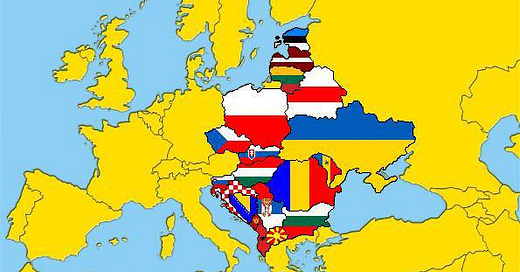Visegrad, Three Seas, Intermarium and Prometheism
The geopolitical of National Conservatism and anti-Communism
The Visegrad Group (or “V4”) comprises Poland, Czech Republic, Slovakia and Hungary. These four nations with their close historical, cultural and geopolitical affinities have won a special place in the hearts of Western patriots and conservatives who seek a pushback against the radical Woke agenda threatening Western freedoms. This is because Eastern Europeans understand perfectly well the evil of Communism, having experienced four decades of imposed Communist tyranny.

And it’s a feeling far from exclusive to the Visegrad nations, but indeed throughout the region. It manifests itself in National Conservatism, represented by parties such as PiS (Poland), Fidesz (Hungary), National Alliance (Latvia) and EKRE (Estonia). It is found in other patriotic parties throughout the region and indeed beyond. Just read the Bauska Declaration of Baltic national conservative parties, which acknowledges the cultural threats to the West while also calling for Russia to acknowledge Communist atrocities.
The Intermarium (Międzymorze) is a political concept rooted in the ideals and reach of the Polish-Lithuanian Commonwealth, but with an even greater reach to the nations of Eastern Europe between three seas - Baltic, Adriatic and Black Sea. This has given rise to the Three Seas initiative, which includes the Visegrad Four and expands beyond those. In interwar Poland, the idea of Intermarium was on the minds of many in a nation that had recovered its independence. It has also been embraced by nationalists in Ukraine and Belarus.
Related to this has been the concept of Prometheism (Prometeizm), in which Poland would lend its support to national liberation movements of peoples and nations living under Soviet tyranny. This included Ukraine, Ingrian Finns and Karelia, Cossack communities, and the peoples of the Caucasus, Central Asia and Russian Far East. In 1918-20, many of these nations had the chance to gain independence before being crushed by the Bolsheviks in the course of the Russian Civil War.
The Three Seas Initiative and the relationship between Poland and Georgia are manifestations of this ideal. In Armenia, there has been the emergence of Sasna Tsrer and the National Democratic Pole, which embraces ideas consistent with this (also see the Great Armenia page). And for Belarus, I recommend reading some of the works of Zianon Pazniak here and here.
As the Soviet Union began to crumble, we witnessed the reactivation of nationalist sentiments with a view of repudiating Soviet rule, and reclaiming national identity and dignity. Since the Soviet Union fell, there has only been partial success in realising those goals.

The Visegrad nations can take the initiative in realising the ideals of Intermarium and Prometheism, to realise the aspirations of these nations for civilisation, freedom and dignity. A voice for national identity and values in a world where these things are under constant attack. The Three Seas Initiative would not only benefit the nations of Eastern Europe, but also those of the Caucasus such as Armenia and Georgia.
Furthermore, these countries must also take the initiative in supporting the liberation of Iran. An Iran free from Islamist tyranny will be a logical partner and ally to the Visegrad Group. Eastern European and Iranian Diasporas are natural allies as they have experienced Communist and Islamist tyranny taking over their homelands, and it is natural to support those seeking liberation of their homeland from the evil presently ruling it.
What we will see is opening up new horizons and a new age of peace, freedom and prosperity.




